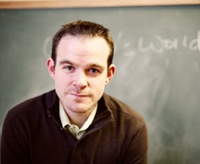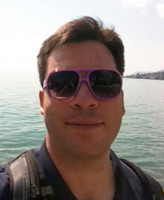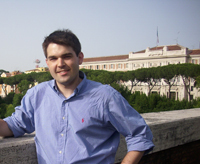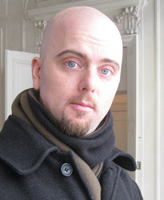Graduate students in the University of Notre Dame’s Department of History attracted significant outside funding support over the last year, including a Charlotte W. Newcombe Doctoral Dissertation Fellowship and four Fulbright U.S. Student Program awards.
Heath Carter, who joined the faculty at Valparaiso University in August, was one of just 21 Ph.D. students nationwide to receive a 2011–12 Newcombe fellowship from the Woodrow Wilson National Fellowship Foundation. The program supports students in the humanities and social sciences whose work has “significant potential for advancing academic scholarship related to ethics and/or religion.”
The Fulbright U.S. Student Program funds up to a year of research and study abroad in more than 140 countries. Approximately 1,000 winners are selected each year based on their academic and leadership potential.
Ph.D. candidate Adam Asher Duker received a 2012 Fulbright to Switzerland and a Bourse de la Confédération Suisse for work on his dissertation, “Providence Under Pressure: Israelite Identity and Siege Warfare in France and Geneva, 1562–1602.” Three other current Ph.D. candidates—Max Deardorff, Nathan Gerth, and John Moscatiello—were awarded 2011 Fulbright grants to support research that spans education policy, government bureaucracy, and religion.
Religious and Working Class History

Titled “Union Made: Working People and the Rise of Social Christianity in Chicago, 1865–1914,” Carter’s dissertation examined the struggles within Catholic and Protestant churches as the institutions wrestled with “the labor question.”
“During the late 19th century, northern American cities like Chicago experienced deep unrest as a vast, poor, and predominantly foreign-born workforce faced off against a small but fabulously wealthy elite,” says Carter, who received his Ph.D. in summer 2012. “Strikes, riots, and violent confrontations in the streets were common, many of these sparked by questions about wages, hours, working conditions, etc.
“My research asks how the Christian churches made their peace with an economic system within which the mighty were not cast down and the lowly were not exalted—as well as how Americans more broadly came to accept the dramatic inequalities that shape our society still today.”
Christian Identity and Holy War

Duker’s dissertation research explores the intellectual, cultural, emotional, and psychological facets of Christian identity during the French Wars of Religion and the Savoyard siege of Geneva.
“I hope to reconstruct and critically examine how Christians during the Reformation era sought to monopolize the identity of ancient Israel, and how this identity had the power to both inflame and pacify confessional violence,” he says. “By understanding the discourse and modes of thought of these Christians, I intend to identify how specific aspects of religious belief and identity inspired confessional hostility. My research will forward our understanding of the rhetoric and reality behind religious warfare in early modern Europe.”
Duker will spend the 2012–2013 academic year at the Institut d'Histoire de la Réformation (IHR), which is housed at the Université de Genève. He will be working in the IHR’s collections, the Archives d’Etat de Genève, and the special collections room at the Bibliothèque de l'Université de Genève.
“I am thrilled for the opportunity to continue my research in Geneva this year,” he says, adding that he hopes to take shorter research trips to other collections in Switzerland and France, as well.
Universal Education Program

A scholar of colonial Latin American and global history, Deardorff is writing his dissertation on the ways in which the state and the Church cooperated to create a universal educational program in 16th century Spain and its colonies.
“For the first time, the kings of Spain sought to implement a program that applied to every person who lived within the borders of their realms—an important transition in the relationships between individuals and the states of which they formed part,” he says. “This new, idealized citizenship was predicated upon the demonstration of Christian belief and the appropriation of Spanish cultural customs.”
Deardorff, who used his Fulbright to conduct archival research in Spain, seeks to discover “whether the real, daily process of acculturation ever looked anything like the ideals mapped out in formal meetings.”
Bureaucrats and State Power

For his Fulbright, Gerth spent 10 months in Tver, Russia, a city northwest of Moscow. There, he dug through archival documents—everything from criminal investigation reports to hospital and school records—to study the lives and work of provincial bureaucrats.
His dissertation explores how local bureaucracies laid the groundwork for a powerful modern state in Russia.
“Examining their world,” Gerth says, “will help us further understand what changes in provincial society helped spark the major social upheavals that Russia experienced during the latter decades of the 19th century.”
Medieval Spanish Life
Moscatiello focuses his doctoral work on medieval Iberia, social history, the history of Christianity, the history of the family, and domesticity. In 2010, he chaired an international graduate student conference at Notre Dame called “From Iberian Kingdoms to Atlantic Empires: Spain, Portugal, and the New World, 1250–1700.”
“Our conference caught the attention of the editors of the Journal of Medieval Iberian Studies, who agreed to publish a special issue of the conference proceedings in 2012,” Moscatiello says, adding that one of the editors, Julio Escalona Monge, then offered to sponsor his application for a Fulbright to Spain.
In Madrid, Moscatiello collaborated with scholars at the Consejo Superior de Investigaciones Científicas (Spanish National Research Council) to do archival investigations for his dissertation on the history of private life and domesticity in medieval Spain—specifically the everyday interactions between Muslims, Christians, and Jews.
Learn More >
- Department of History graduate programs
- Related story: History Ph.D. Candidate Wins Newcombe Fellowship
- Related story: Three History Ph.D. Students Awarded Fulbrights
- Related story: History Ph.D. student Awarded Fulbright to Switzerland
- Fulbright U.S. Student Program
- Charlotte Newcombe Doctoral Dissertation Fellowships